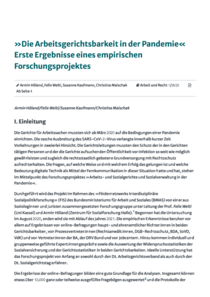"Die Arbeitsgerichtsbarkeit in der Pandemie". Erste Ergebnisse eines empirischen Forschungsprojektes

Höland, Armin ; Welti, Felix ; Kaufmann, Susanne ; Maischak, Christina
2022
70
01
January
4-7
epidemic disease ; labour court
Law
German
Bibliogr.
"Wie in anderen Bereichen hatte die Anfang 2020 in Deutschland ausgebrochene Sars-CoV-2-Pandemie weitreichende Auswirkungen auf Organisation und Rechtsprechung der Arbeitsgerichte. Nach den bundesweit erhobenen Befragungsdaten des Forschungsprojekts »Arbeits- und Sozialgerichte und Sozialverwaltung in der Pandemie« haben die Gerichte die gesundheitspolitischen Erfordernisse der Kontaktbeschränkung, des sozialen Abstands und verstärkter Alltagshygiene durchweg zufriedenstellend bewältigt. Zu Verzögerungen in arbeitsgerichtlichen Verhandlungen kam es vor allem in der Zeit bis Sommer 2020 aufgrund zeitweiliger Schließung von Gerichten und Verschiebung mündlicher Verhandlungen.
Die naheliegende Frage nach Nutzung digitaler Kommunikationsangebote führt zu ernüchternden Antworten, zugleich aber auch zur Beobachtung einer in den Jahren 2020 und 2021 deutlich zunehmenden Häufigkeit von Bild- und Tonübertragung. Für die bereits seit 2002 rechtlich möglichen Videokonferenzen gab es vor der Pandemie ganz überwiegend weder Bedarf noch Ausstattung. Das hat sich 2020, auch im Zusammenwirken mit der Einführung des elektronischen Rechtsverkehrs, rasch geändert. Die Digitalisierung des Gerichtsbetriebs wird künftig deutlich mehr Bedeutung erlangen. Dennoch soll es nach ganz vorherrschender Meinung der hauptberuflichen wie der ehrenamtlichen Richter:innen für die mündliche Verhandlung beim Regelfall der Präsenz im Gericht bleiben.
"The Labour Courts in the Pandemic" First Results of an empirical Research Project
Like in many other parts of society the outbreak of the Sars-CoV-2-pandemic in Germany had, since 2020, a far-reaching impact upon the organization and the judicial activities of labour courts. As the data of the nationwide surveys carried out by the empirical research project »Labour courts, social security courts and social administration in the pandemic« show that courts managed quite well to comply with the requirements of the restriction of contacts, providing for social distance and for increased everyday hygienic. Regarding the access to justice and the settling of disputes the pandemic crisis left more problematic traces. Especially between spring and summer 2020 many labour courts were closed down and oral hearings postponed.
In this situation, one could think that digitalized communication could have helped as an alternative. But, as it turned out, due to the lack of equipment and experience video conferences of labour courts, permitted by law since 2002, were an extremely rare event prior to 2020. Linked to the requirements of the electronic legal transactions, that situation has quickly begun to change in 2020 and 2021. Partly digitalized communication will increasingly become part of court proceedings in both jurisdictions. This, however, does not put into question that oral hearings in the court room should, following the majorities of professional and honorary judges in the surveys, remain the normal way of proceeding."
Digital
The ETUI is co-funded by the European Union. Views and opinions expressed are however those of the author(s) only and do not necessarily reflect those of the European Union or the ETUI.